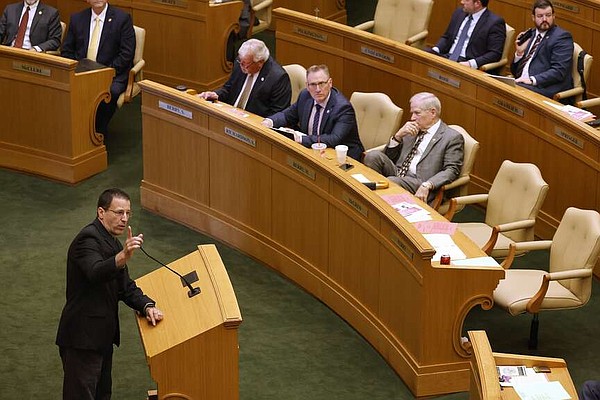Cryptocurrency mining legislation swiftly passes through House before reaching Sanders for final approval | Arkansas Democrat Gazette

The Arkansas House of Representatives voted Wednesday to send two bills meant to strengthen regulations on cryptocurrency mining within the state to Gov. Sarah Huckabee Sanders for her signature.
If Sanders signs Senate Bill 78 and Senate Bill 79, the bills will immediately go into effect because of an emergency clause included in each.
Senate Bills 78 and 79 are sponsored by Republican Sens. Joshua Bryant of Rogers and Missy Irvin of Mountain View, respectively. The proposed measures address issues that include local control over crypto mining regulation, noisy facilities, and ownership of crypto mines by certain foreign parties.
House lawmakers voted 93-4 to approve Bryant’s bill, with three not voting. The votes against his bill were made by Rep. Andrew Collins, D-Little Rock, Rep. Justin Gonzales, R-Okolona, Rep. Ron McNair, R-Harrison, and Rep. Chad Puryear, R-Hindsville.
The body voted 93-5 to approve Irvin’s bill, with two senators not voting. Voting against the bill were Collins, Gonzales, Rep. Jack Ladyman, R-Jonesboro, Rep. Austin McCollum, R-Bentonville, and Rep. R. Scott Richardson, R-Bentonville. Nobody voted present on either bill.
Sanders has three options under the state’s Constitution when bills are sent to her by the Legislature: sign the proposed legislation, veto them, or let them become law without her signature. A simple majority vote in the Senate and House is needed to override a governor’s veto.
Governor’s office spokeswoman Alexa Henning did not directly comment on whether the governor would sign the proposed measures but said in an emailed statement “The Governor was the first in the country to kick a Chinese communist owned company out of her state and strongly supports outlawing foreign adversaries from owning crypto mines in Arkansas, while protecting rural communities and empowering them to crack down on bad actors.”
If the bills become law, crypto mining businesses already in operation would have 90 days to comply. Any prohibited foreign party-controlled business operating a crypto mine in Arkansas before the bills become law would have one year to divest all interest in that enterprise. If the attorney general concludes a violation of this rule has taken place, the attorney general may then order that party to divest within the next year.
The proposed measures were introduced as nonappropriation bills in a fiscal session, requiring first that resolutions authorizing them be approved by a two-thirds vote of the Senate and House. Lawmakers have said the bills likely mark only the start of lawmakers’ considerations of crypto mining regulations in Arkansas. They expect additional bills regarding the industry will be introduced during the 2025 regular session.
The two bills come after lawmakers passed Act 851 of 2023, known as the Arkansas Data Centers Act. While the law easily passed last year — with a similar measure signed into law in Montana last May — many Arkansas lawmakers have since called for greater regulation of such facilities after noisy crypto mining operations sprouted up around the state. Among those lawmakers is Bryant, who sponsored Act 851.
Estimates vary over how many crypto mines operate in Arkansas. Bryant said he is aware of 18 crypto mines in the state. Rep. Lane Jean, R-Magnolia, said he received a list that showed about 30 crypto mining operations in Arkansas but added “I know it wasn’t accurate because I have one in my county and it wasn’t accounted for.”
Bryant has said Senate Bill 78 attempts to “clarify local control and make sure that local control does have the authority to regulate within their jurisdictions.” It also clarifies that people “acting in their individual capacities” have the right to crypto mining within their home, which the senator labeled a hobby.
The bill would require that crypto mining operations “apply noise-reduction techniques,” such as using liquid cooling and “fully enclosing the envelope.” The latter technique involves enfolding the space where noise from a crypto mining business is directly produced around all sides, including above and below the equipment that produces the sound.
According to the bill, a crypto mining facility may use a passively cooled, premanufactured container without enclosing the space in a complete envelope if the business locates or relocates to a site that is at least 2,000 feet from the nearest residential or commercial use structure, or an area zoned for industrial use or “an otherwise approved use.”
A person who owns land within 2,000 feet of the nearest property line of a crypto mining business may file a lawsuit in circuit court to enforce the noise-reduction techniques listed in the proposed legislation.
Senate Bill 79 would require crypto mining businesses to get a permit from the Oil and Gas Commission to operate. Irvin has said the bill “provides a state presence of regulatory oversight” to crypto mining operations.
Both bills prevent certain “prohibited foreign parties,” such as China and other entities subject to the International Traffic in Arms Regulations, from owning crypto mines in Arkansas. Under both bills, a prohibited foreign party-controlled business includes one in which the party possesses an “ownership interest of greater than zero percent.”
The bills define a prohibited foreign party as a person, party, or government subject to the International Traffic in Arms Regulations, which are federal rules meant to restrict the sale of arms to and from certain foreign governments. Many lawmakers have expressed concerns that some crypto operations have ties to China or other adversaries of the United States.
As of October, Chinese investors operated at least three mines in Arkansas, according to the New York Times.
Civil penalties and damages received by the attorney general’s office under the section on foreign party-controlled businesses would be split between the state Oil and Gas Commission fund and the attorney general’s office, according to the proposed legislation.
“I am thankful to my House colleagues for approving this important legislation,” Bryant said in a statement. “This bill will help ensure the digital asset mining industry operates in our state in a way that aligns with industry standards as they relate to noise and vicinity, while also ensuring foreign adversaries like China do not operate in our state.”
Speaking in favor of Senate Bill 78, Rep. Stephen Meeks, R-Greenbrier, said crypto mines have operated in the state “for a long time” and that many have been “good neighbors.” However, he said foreign-owned mining operations that have sprung up in the state since the passage of Act 851 have been disrespectful to his constituents.
“These foreign actors who want to come in — they want to disrespect our citizens, disrespect our resources,” he said. “With the passage of this bill we tell them it’s time to leave and go somewhere else.”
No one spoke against either bill during Wednesday’s floor session, though lawmakers have expressed concern and occasionally direct criticism over their ability to address such issues as noise generated by the facilities, the consequences of restricting foreign investment in crypto mining operations, and who receives awards from actions taken against businesses found to violate these rules.
Collins, one of the representatives who voted against both bills, said after the floor session his perception of the proposed measures was “not totally negative” but that he worries the bills will have a chilling effect on foreign investments and immigration remains unchanged. The lawmaker said he doesn’t think a person being a resident or citizen of a “certain country” was an issue, describing the portions of the bills that deal with foreign parties as “a solution in search of a problem.”
However, Collins said he believed a number of lawmakers will work to improve regulation around crypto mining during next year’s regular session. He said legislators’ priorities around the industry should focus on protecting the environment and limiting the noise they generate.
“Hopefully we’ll come back and do some better work next session,” he said.
Lawmakers spent two hours discussing and posing questions to the bills’ sponsors about their proposed legislation during a House City, County, and Local committee meeting Tuesday.
Rep. Frances Cavenaugh, R-Walnut Ridge, asked Bryant and McClure during the meeting why none of the money would go back to local governments or entities “that have to take the brunt” of issues caused by crypto mining. Bryant responded that the Arkansas Department of Energy and Environment, as well as Attorney General Tim Griffin’s office, would be the figures to investigate and enforce compliance with the rules.
“I think our intent is to send a clear message that those that fall under foreign ownership will be forced to divest and, if they don’t, damages will apply,” Bryant said.
Rep. Ashley Hudson, D-Little Rock, questioned the effects of the restrictions on local parties. When asked by Hudson whether a party operating in Arkansas would be forced to divest if its country becomes a prohibited foreign party at a later date, Bryant said he believed so but that he did “not know the answer to that today.”
Hudson asked if the rule might create a constitutional issue under the Equal Protection Clause, to which Bryant said he believed the attorney general would be willing to weigh in on the issue.
Faced with similar questions from Collins over the prohibited foreign parties rules, Irvin said she trusts the list of those subject to the International Traffic in Arms Regulations.
“There’s a reason why they’re on that list,” she said.
Rep. Mindy McAlindon, R-Centerton, asked why Senate Bill 78 doesn’t specify an acceptable noise level for crypto mining operations, relying instead on language that describes an acceptable level as one “that is acceptable to a reasonable person under similar standards.”
Bryant cited sudden changes in noise levels caused by such factors as temperature or wind direction, and that any language placed in the bill that specified a decibel level would result in governments “continuously pursuing something that isn’t pursuable.” Instead, they were advised to use the “reasonable” standard, he said.
“We’re going to let the industry, through their own material basically and the judgment of the courts, determine what is a reasonable nuisance,” Bryant said.
The bills received broad approval in the Senate, with lawmakers voting 26-3 in favor of Senate Bill 78 and 32-0 in favor of Senate Bill 79. However, Sen. Bryan King, R-Green Forest, as well as Sen. Stephanie Flowers, D-Pine Bluff, have been outspoken in their criticism of the bills, suggesting the bills do not go far enough in regulating the industry.
Source link
#Crypto #mining #bills #sail #House #Sanders #signature #Arkansas #Democrat #Gazette





